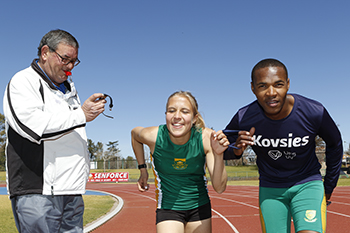
Rufus Botha (left), coach of the athlete Louzanne Coetzee,
went overseas with Coetzee and her guide,
Khothatso Mokone, for a race for the first time.
Coetzee improved her T11 5 000 m world record with more
than 20 seconds in Switzerland.
Photo: Johan Roux
She fought against illness, had to get the green light from medical personnel shortly before her main race, and was very nervous. However, on 5 June 2017, the blind athlete Louzanne Coetzee managed to improve the T11 5 000 m world record with more than 20 seconds.
The Kovsie star’s time of 18:14.27 at the ParAthletics Grand Prix in Nottwil, Switzerland, was approximately 23 seconds faster than her previous world record (18:37.23). In addition, Coetzee, who works at the Institute for Reconciliation and Social Justice at the University of the Free State, also improved the South African T11 800 m record to 2:30.18 on 2 June 2017, and her 4:59.54 on 3 June 2017 in the T11 1 500 m was almost another national record.
Carried by UFS and other support
“One could never be ungrateful when running close to your personal best,” Coetzee said. “Fortunately, with God’s blessing, the support of everybody at home, support from the university, as well as my mom and them, it really was a very blessed and successful event.”
According to her coach, Rufus Botha, Coetzee was not feeling well before the event and had to get medical clearance before the 5 000 m. He told her not to run too hard, even though their goal was 18:20. “She ran an incredible final 600 m, which brought the time down to 18:14,” he said. “It was amazing to watch.”
Botha’s knowledge valuable abroad
He enjoyed going overseas with Coetzee and her guide, Khothatso Mokone, for the first time. “His (Botha’s) experience, knowledge, support, and coaching was extremely valuable,” Coetzee said. “It will definitely help me in future: how to approach things, and everything he shared with us.”